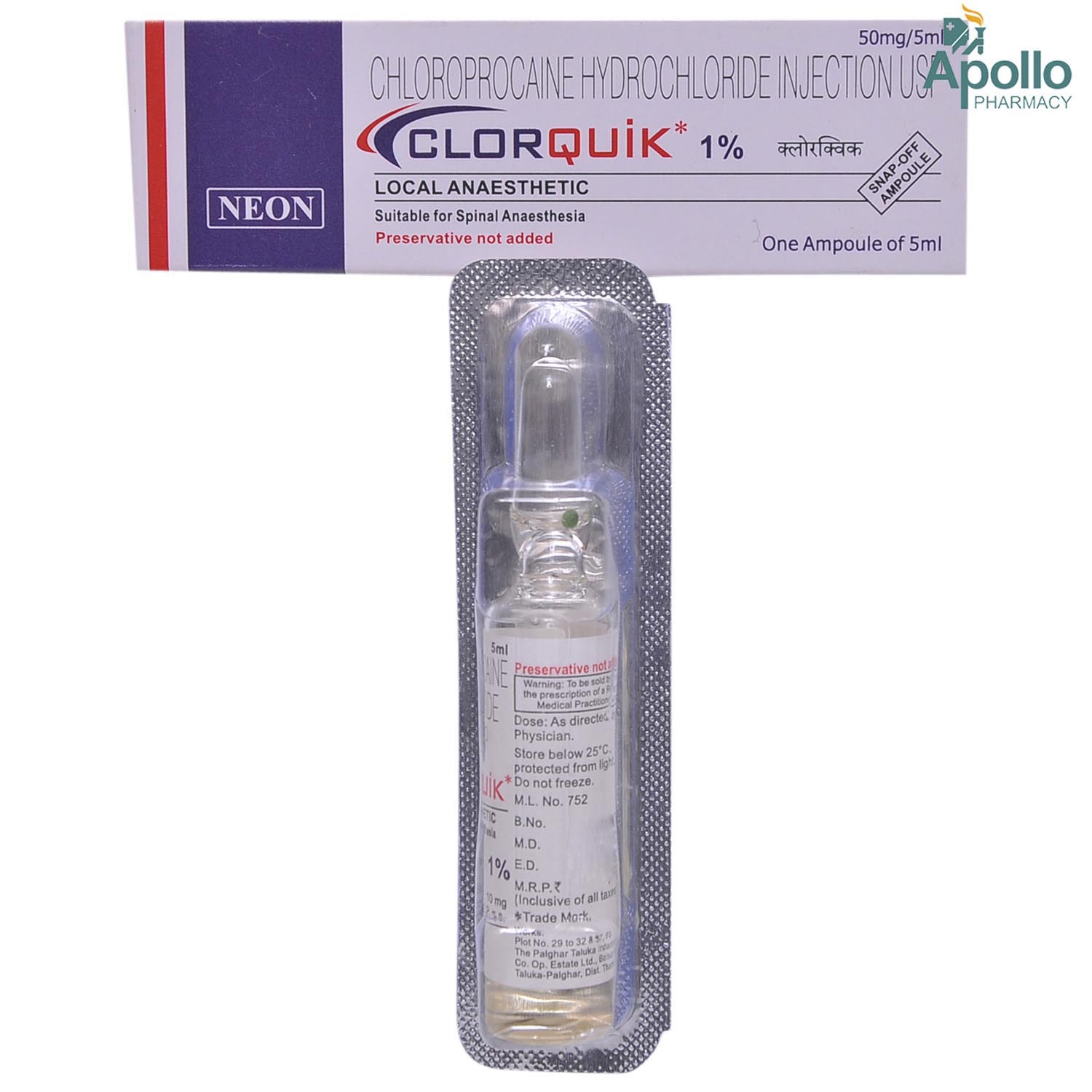Chloroprocaine Hydrochloride
About Chloroprocaine Hydrochloride
Chloroprocaine Hydrochloride belongs to the group of medicines called local anaesthetic agents indicated for the intrathecal injection in adults for the production of local anaesthesia. It numbs specific body parts and prevents pain during surgery.
Chloroprocaine Hydrochloride contains Chloroprocaine hydrochloride, which works by blocking the generation and conduction of nerve impulses. Thereby it decreases the sensation of pain.
In some cases, Chloroprocaine Hydrochloride may cause nausea, low blood pressure, vomiting, dizziness, and restlessness. Most of these side effects may not require medical attention and gradually resolve over time. However, if the side effects persist or worsen, please consult your doctor.
Consult the doctor if you are pregnant or breastfeeding. Do not drive or operate machinery after receiving Chloroprocaine Hydrochloride. Keep your doctor informed about your health condition and medications to rule out any side effects/interactions.
Uses of Chloroprocaine Hydrochloride
Medicinal Benefits
Chloroprocaine Hydrochloride belongs to the group of medicines called local anaesthetic agents indicated for the intrathecal injection in adults for the production of local anaesthesia. It numbs specific body parts and prevents pain during surgery. Chloroprocaine Hydrochloride contains Chloroprocaine hydrochloride, which works by blocking the generation and conduction of nerve impulses. Thereby it decreases the sensation of pain.
Directions for Use
- Chloroprocaine Hydrochloride will be administered by a healthcare professional.
- Do not self-administer it.
Storage
Side Effects of Chloroprocaine Hydrochloride
- Nausea
- Vomiting
- Dizziness
- Restlessness
- Low blood pressure
Drug Warnings
Do not use Chloroprocaine Hydrochloride if you are allergic to any of its components, or if you have hypovolemia (low blood volume) or serious cardiac conduction problems. Inform the doctor if you have/had liver or kidney disease, very low blood pressure, blood clotting problems, fluid in the lungs, blood poisoning, heart problems, skin reaction or inflammation at the site of injection. Consult the doctor if you are pregnant or breastfeeding. Let the doctor know if you are taking any prescription/non-prescription medicines, herbal products or supplements.
Drug Interactions
Drug-Drug Interactions: Inform the doctor if you are taking medicines used to treat irregular heart rate, low blood pressure, pain or cholinesterase inhibitors.
Drug-Food Interactions: No interactions found/established.
Drug-Disease Interactions: Inform the doctor if you have hypovolemia (low blood volume) or serious cardiac conduction problems.
Drug-Drug Interactions Checker List:
Safety Advice

Alcohol
consult your doctorIt is not known if alcohol interacts with Chloroprocaine Hydrochloride. Please consult the doctor.

Pregnancy
cautionChloroprocaine hydrochloride belongs to pregnancy category C. It should be used during pregnancy only if clearly needed.

Breast Feeding
cautionIt is not known if Chloroprocaine hydrochloride passes into breastmilk. Caution should be exercised while administering Chloroprocaine Hydrochloride to breastfeeding women.

Driving
unsafeChloroprocaine Hydrochloride may interfere with your ability to drive. Therefore, avoid driving and operating machinery after receiving Chloroprocaine Hydrochloride.

Liver
cautionIf you have a history of liver impairment, inform the doctor before receiving Chloroprocaine Hydrochloride.

Kidney
cautionIf you have a history of kidney impairment, inform the doctor before receiving Chloroprocaine Hydrochloride.

Children
cautionPlease consult the doctor if you have any concerns regarding the usage of Chloroprocaine Hydrochloride in children.
Habit Forming
Patients Concern
Disease/Condition Glossary
Anaesthesia: Anaesthesia is the use of medications called anaesthetics to prevent pain during surgery or other procedures. This causes a loss of sensation, feeling, and awareness.
FAQs
Chloroprocaine Hydrochloride is used as a local anaesthesia.
Chloroprocaine Hydrochloride works by blocking the generation and conduction of nerve impulses.
Chloroprocaine Hydrochloride may cause low blood pressure. Therefore, if you have hypotension/low blood pressure, inform the doctor before receiving Chloroprocaine Hydrochloride.
Chloroprocaine Hydrochloride may cause methemoglobinemia (a blood disorder that affects how red blood cells deliver oxygen throughout the body). Consult the doctor if you experience headache, rapid heart rate, shortness of breath, fatigue, lightheadedness, or pale, grey or blue-coloured skin.
Inform the doctor if you have any medical conditions or if you are taking any other medications. Let the doctor know if you are pregnant, think you may be pregnant or breastfeeding.
The common side effects of Chloroprocaine Hydrochloride may include nausea, low blood pressure, vomiting, dizziness, and restlessness. Most of these side effects may not require medical attention and gradually resolve over time. However, if the side effects persist or worsen, please consult your doctor.
Chloroprocaine Hydrochloride will be administered by a healthcare professional through the intrathecal route. Do not self-administer.
Generally, the dose of Chloroprocaine Hydrochloride is decided based on the type of surgery and the level of anaesthesia required. The doctor will decide the dose of Chloroprocaine Hydrochloride based on your condition.
You are recommended to consult your doctor if you have any concerns regarding the usage of Chloroprocaine Hydrochloride in children. The doctor will determine if it is safe for use in children.









